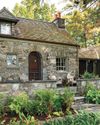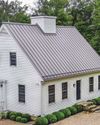
OVER TIME, MANY OF THE 1890s brick-and-brownstone row houses ringing downtown Minneapolis were demolished to make way for freeways and urban development. This one survived, despite a 1979 renovation that divided the building into condominiums and stripped out the original woodwork.
The homeowner's condo occupies half of the second floor and all of the top floor, affording million-dollar views of downtown. Research found that the building was designed by architect Warren Howard Hayes and built in 1889. It deserved better.
"I was drawn to working with an architect because I knew they would be able to bring creative problem solving and an artistic finesse that builders might not," says homeowner Seth Goodspeed, who chose David Heide Design Studio after seeing their work on another historic row house. "The Studio brought a lot of value ... because this is a tight space, I had an even better reason to hire an architect.
I also wanted someone who valued the architectural heritage of the building." "When Seth interviewed us, we realized he would be our youngest client-by more than a few years," Heide says, "He wanted to do well by the building and to spend his money wisely."
During the 1979 conversion, the floor plan had changed and the plaster was removed from the brick walls. The only original element was the staircase, though the balustrade was hidden behind knee walls. The second-floor space had been open concept-with no walls or closets.
This story is from the {{IssueName}} edition of {{MagazineName}}.
Start your 7-day Magzter GOLD free trial to access thousands of curated premium stories, and 9,000+ magazines and newspapers.
Already a subscriber ? Sign In
This story is from the {{IssueName}} edition of {{MagazineName}}.
Start your 7-day Magzter GOLD free trial to access thousands of curated premium stories, and 9,000+ magazines and newspapers.
Already a subscriber? Sign In

faded luxe IN A RETURN TO SAVANNAH
Residents of the Blue Ridge Mountains find their city home in a converted commercial building in beautiful Savannah, Georgia.

a hudson valley VERNACULAR
When Harlan Bratcher started looking for a country house in New York, in 1990, he knew what he wanted-something peaceful and serene, an escape from the hectic lifestyle of Manhattan.

the Dr. Mills house RESTORED
In rural Washington State, a dedicated couple bring back a 1912 bungalow that once had been the town's hospital.

The Right Masonry Tool for Repointing
The mortar between individual bricks or stones begins to erode after many years. That might be attributed to rain and wind, leaky gutters, building settlement, or such chemical agents as de-icing salts.

How To Remove Wallpaper
There's more than one way to do it; try them all until you find what works for your situation.

living with PLASTICS anxiety
Plastics are ubiquitous in modern life. Even houses built long before vinyl caught on are now full of polymer-based products, from the hoses in pull-down faucets to plastic light switches. Now that we know exposure to certain plastics can be hazardous to human health, we need guidance on how to evaluate building products for potential impacts.

homey Craftsman Textiles today
For bungalows, Craftsman houses, and Tudors that might have rather severe woodwork and furniture, textiles are a critical part of the decorative scheme.

Navigating the Lumberyard - Here's some lumber lingo you should know before you venture into a lumberyard.
Here's some lumber lingo you should know before you venture into a lumberyard. Almost everyone fixing an old house will end up at a lumberyard-whether it's a local supplier or the organized aisles of a big-box home-improvement store.

a farmhouse renewed
Sensitive renovations and restoration work preserved a house that dates to 1799.

AN OVERVIEW OF METAL ROOFING
METAL ROOFS ARE RESURGENT, FOR GOOD REASONS.